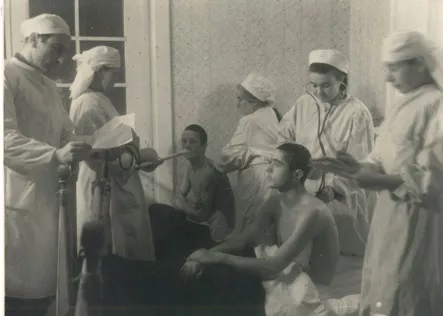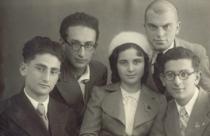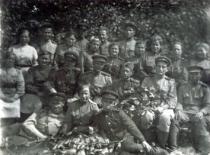This is me Boris Molodetski (first from the left) in the medical unit of the division during a round check up. This photo was taken in Chernyshevskoye village, Nesterov district, Kaliningrad region in 1954.
After the Great Patriotic war I served in Bobruysk in Byelarus. Every month I sent my mother 10 kilograms of flour and half of my salary. She didn't even have a food card. In 1947 I met my future wife Lidia Vdovina in the hospital. We got married two years later. Lidia is Russian. She was born to a wealthy family in Gornoaltaysk in 1922. Before the war Lidia finished an obstetrician school in Gornoaltaysk. During the war she was an assistant doctor and joined the Party.
When I got married I only had one suit. I gave my mother all money I earned. My wife also supported her mother and she wore a coat with shoulder straps removed from it. Even in 1950 I still didn't have a coat and was upset to have to wear my military overcoat to a New Year party in the house of officers. When we came in I took my hand off her elbow so that my fellow comrades didn't notice my miserable material condition. In the regiment where I served as chief doctor pilots of an air force logistics base pilots made contributions to a fund 1000 rubles each and then drew lots and whoever got lucky bought a Moskwich or Pobeda car [Soviet cars]. Within a year all pilots got new cars.
The period of Doctors' Plot didn't have any impact on me. I knew that accusations against leading doctors in the Soviet medical science about purposeful poisoning of the population were obviously made up. However, I didn't dare to express my critical opinion about it to anyone. Nobody changed their attitude to me at my work. Besides, chief of our hospital was a Jewish man. Two days before Stalin died I read a report on his health condition in a newspaper and thought that it indicated that he had a stroke, his Chain-Stocks breathing and other symptoms, this indicated that he was dying. When Stalin died my wife who was a communist said like everybody else around 'How will we go on living?' I didn't share her opinion since I believed that Stalin was a dictator and had been thinking so for a while. My only concern was that Beriya, this butcher of a man, could win the struggle for power.
On 9 January 1952 my son Grisha was born. We lived in Chernyshevskoye village, in Nesterov district, Kaliningrad region. I worked as a military doctor in a military unit. We very poor living conditions. I had to fetch water in buckets onto the third floor. We cooked on a kerogas stove. On 31 January 1953 my daughter Zoya was born in Chernyshevskoye. In 1956 we moved to Paplaka in Latvia. It was a district town. There were an artillery and tank regiments near this town. They had a medical unit, a bakery and a bathtub. I served as chief of medical unit in the rank of a major. We stayed there for over a year.




















